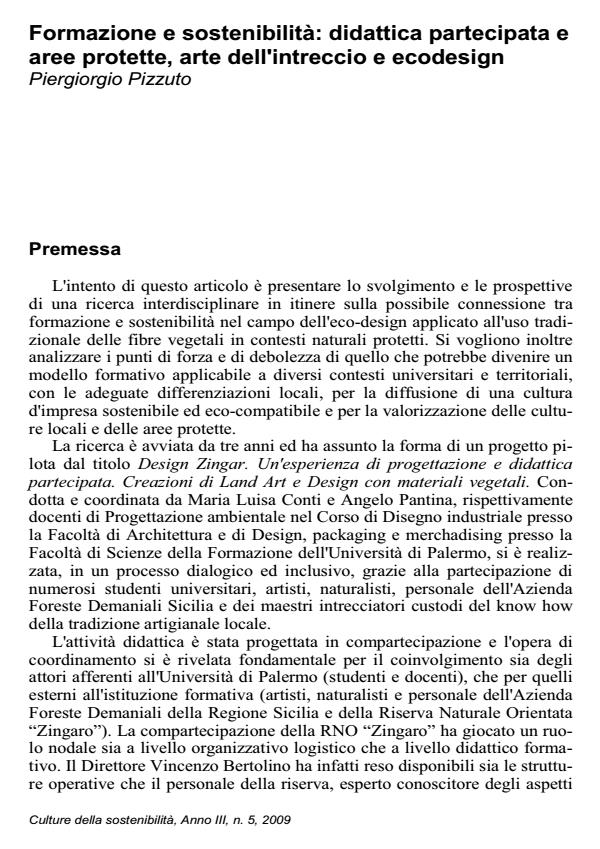Formazione e sostenibilità: didattica partecipata e aree protette, arte dell'intreccio e ecodesign
Titolo Rivista CULTURE DELLA SOSTENIBILITA '
Autori/Curatori Piergiorgio Pizzuto
Anno di pubblicazione 2009 Fascicolo 2009/5
Lingua Italiano Numero pagine 16 P. 160-175 Dimensione file 125 KB
DOI 10.3280/CDS2009-005010
Il DOI è il codice a barre della proprietà intellettuale: per saperne di più
clicca qui
Qui sotto puoi vedere in anteprima la prima pagina di questo articolo.
Se questo articolo ti interessa, lo puoi acquistare (e scaricare in formato pdf) seguendo le facili indicazioni per acquistare il download credit. Acquista Download Credits per scaricare questo Articolo in formato PDF

FrancoAngeli è membro della Publishers International Linking Association, Inc (PILA)associazione indipendente e non profit per facilitare (attraverso i servizi tecnologici implementati da CrossRef.org) l’accesso degli studiosi ai contenuti digitali nelle pubblicazioni professionali e scientifiche
Formazione e sostenibilità: didattica partecipata e aree protette, arte dell'intreccio e ecodesign - The intent of this paper is to present the results and the proceedings of an interdisciplinary research about connections between training and sustainability in the field of eco-design applied in the traditional use of plant fibers. The research has begun three years ago and has taken the form of a pilot project entitled Design Zingaro - a participating experience of planning and training. Creations of Land Art and Design with plant materials. It was realized in an inclusive process of dialogue, trough participation of many university students, artists, naturalists, forest staff and master weaver of traditional know-how of local craft. The educational activity was designed in partnership with all the stakeholders. The action of coordination has revealed vital for the involvement of both participants linked to University and external ones (artists, naturalists, forest staff and master weaver). From the methodological point of view, the process of training and planning has to be analyzed, through an ecological approach to epistemology and by a systemic view. The analysis has to be focused on relationships that enabled the conduct of the process. The main nodal relationships form the basis to build up a reticular and systemic model, able to describe the complexity of our process. There are many thematic issues covered by the research. They are all closely interlinked with each other: 1. the report of the observer with the process under study 2. arrangements and approaches of participing planning and training 3. institutional cooperation 4. the handing down of traditional know how of interlacement with plant fibers 5. fieldwork and residential workshops Abstracts 187 6. design production and artistic outcomes 7. the realization of a quality label for sustainable products 8. public events, promotion and diffusion 9. mass media and international forum.
Piergiorgio Pizzuto, Formazione e sostenibilità: didattica partecipata e aree protette, arte dell'intreccio e ecodesign in "CULTURE DELLA SOSTENIBILITA '" 5/2009, pp 160-175, DOI: 10.3280/CDS2009-005010